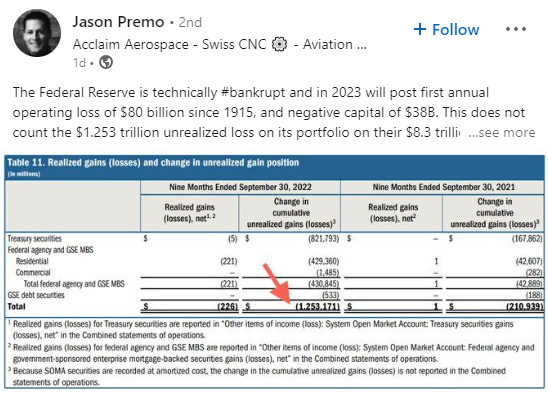Why Would Silicon Valley be Ground Zero for Banking Centralization? Part 3
The Monetary Wars: Part 18
Check here for other articles (including Parts 1 and 2) on the Monetary Wars.
If you're wondering why I'm on part three of this series, and I still haven't said much of anything about Silicon Valley, it's because I'm an asshole. Also, I'm building another company with some friends, so it's not easy to devote 20 hours to all of this all at once. And I'm sleeping more than I did around this time last year, which is to say, "just enough."
It Could Have Happened to Anybody?
There is no reason why Ground Zero had to be in Silicon Valley. The banking system was doomed to collapse because it has been a very long time since the health of the system was the priority of anyone in charge. I could write multiple articles on that statement alone. But let's think a little more near-term.
This is debt that will be rolled out (because there is no means by which to pay it off) at far higher interest rates than in recent times. But let's be clear: short duration debt was available for all the banks to buy. So, why didn't they?
One reason is that the Fed specifically encouraged banks to buy longer maturity bonds, despite the fact that they were raising interest rates through an inflationary period. Yes, the Fed encouraged the actions that turned into a massive liquidity crisis. We could say that the Fed was simply desperate to avoid the debt spiral that is developing, regardless. They wanted to issue as much longer-term debt as possible. Perhaps they should have tempered their encouragement of poor liability-debt mismatching with basic instructions to keep enough short term paper to cover their clients' operating needs?
Or maybe the Fed had their own immediate needs and priorities?
That said, banks were not required to bite. And SVB was the bank that did. Why?
Quick: Somebody release some shocking January 6, 2001 footage!


Aaaaaaaand…Scene!
Why Silicon Valley?
"Everyone is working with FDIC to stabilize the situation as quickly as possible, to protect jobs, people's livelihoods, and the entire innovation ecosystem that has served as a tent pole for our economy." -California Governor Gavin Newsom
Silicon Valley is, of course, home to the smartest people on the planet outside of (1) permanent unelected bureaucrats, and (2) those people who were clever enough to be born to magnificently wealthy parents. It's also home to some of those two kinds of people, too, and also some drugged out zombies and Woke Zombies with college debt that will likely disappear if the banking system collapses. Remember that. These and other reasons are why the smart people who aren't yet wealthy or powerful enough to pull strings stay in town just as long as they can take it. Given all the smarty smarts in the Bay Area, you would think that somebody would have recognized that interest rates going from a speck above zero to a whole bunch of basis points higher deforms that part of the complex plane of debt markets that distinguishes the M0 and M1 money supplies.
We are in a World Currency War now—one that may be far more deadly in the medium-run than any past or present pseudo-pandemic.
So, we should take a step back and start thinking about the motivations of the players involved.
Spoiler alert: The dollar will win in the short run. In the long run, the strongest currency always wins. In the short run, it's still a fiat currency game, so we'll skip past competition from gold/oil standards and Bitcoin, though they will gain relative to the dollar—and probably by more than a little.
But was the beginning of the inevitable banking crisis (yes, the Bitcoiners have always been right on this point) intentionally sparked in silicon valley?
I can't say for certain, but somehow I feel pretty certain. There are multiple potentially-aligned behemoth interests.
Leadership of BRICS nations.
The Oligarchs who know the dollar is crumbling, and want to time their plans. This likely includes the rollout of a Central Bank Digital Currency (CBDC). Perhaps regulatory control was not Plan B after the attempted FTX establishment of a Global Central Digital Bank, but Plan C. At least they may get a highly consolidated banking system out of all this, which means rewiring fewer machines to form a new network rail for the whizzy new tech we know they've been working on.
The largest retailers who would love to heroically consolidate volume without disruption from any unforeseen startup competitors on the horizon.
People who jumped through all the schooling hoops to reach a point with a well-paying job that affords a small apartment in San Francisco, but still just want to burn the rest of the country to the ground. I don't just mean people who see the problems and want change, or those saying that a debt jubilee is long overdue, but the ones who are radical enough to light the match and enjoy the scenery. They are the accidental, unwitting schizophrenics, wooed by the radical left—which is likely steered by Academia on behalf of the Oligarchs via the Deep State, even if few of those genius professors even know it.
A subset of people who would like to see the national debt paid off for pennies on the dollar.
Opponents of the DoD who know that the Pentagon holds many times as much U.S. debt as the CCP and all the banks in China.
HSBC, which gobbled up part of SVB, further cementing itself as the primary corridor between the CCP and the U.S. tech sector.
Rivals of companies banking with SVB? People who think that SVB depositor Roblox is disturbingly icky?
Whoever might want to push that first domino down in Silicon Valley might be aware that many Americans value the tech sector, which arguably does more good than harm (who knows whether those graphs have crossed or not), and would cry out for some sort of a solution to keep the lights on. Except that a liquidity crisis doesn't need to mean the lights go out. But a panic that spreads contagion is a different matter entirely.
Also, remember that the Fed controls the interest rates. When rates rise, as they have been, asset prices get suppressed across the board (see Part 2). When the Fed decides it wants home prices to rise, it can just flip a switch and POOF…prices can skyrocket again. The Fed could have pivoted any time they wanted, but they waited until the banking sector and the stock market could collapse together.
Oops, I hope I didn't spoil the grand conclusion.
Reasonable question: "Could they really pull all this off?"
Culture Wars in California
Let's take stock in the facts for a moment.
The First Family of California is highly similar to Canadia's Princeling Justin Trudeau. Except that California is larger in every way aside from land area, density of hockey rinks, and annual snow fall. Oh, and it's full of vineyards and Hollywood. They're less closely related to Fidel Castro, but more closely tied to Silicon Valley Bank (SVB). The Woke Zombies are firmly in their corner.
Supposing that some major powers wanted somebody on the inside to pull strings and levers, we should think Jennifer Newsom would be the obvious woman for the job. There would be no need to run the bank into the ground—a task that would be too obvious, and would likely harm some of their friends. But a bailout management out was almost certainly a given from the start.
But how could such influence convince a risk manager to make such an obvious "mistake"?
Meanwhile, the narcissistic, artificially schizophrenic Woke Zombies may soon find out what it means when skyscrapers collapse into their footprints as the result of controlled demolition.
But they're still going to have to sort out that abusive relationship they're in. At least some of them hodl Bitcoin, even if they don't necessarily tell their Tinder dates about it..
This is CZ's flight to quality. There is going to be a lot of flight to quality, though few know what that means, yet.
Flight to Quality: A Historical Tale of Engineers and Politics
"The human foot is a masterpiece of engineering and a work of art." -Leonardo da Vinci
The early, tumultuous history of civilization involves nations and states that come and go. Some were great, leaving behind Great Pyramids in Egypt or the Angkor Wat of the Hindus of Southeast Asia (we think of Hinduism as largely associated with India, but the Khmer Empire of Cambodia grew strong when the right leader found the right land for a great capital in the 12th century). Each had its strengths and weaknesses, and very few survive today due to various Achilles heels.
More than 2700 years ago, the Greek state of Sybaris was founded by a collection of settlers looking to roll up their own stake at a beautiful location in what is now Southern Italy between two rivers and a natural port. The enterprise was bountiful, but after 200 years of amassing riches, the descendants of the founders who had acquired a reputation for their hedonistic ways, began to muck it up.
First, the state created what were arguably the first intellectual property laws. Residents wishing to make use of the technological advances invented by the clever were required to pay for the right to upgrade their lives. Call it a tax on the wealthy, and a socioeconomic separation into classes.
When that wasn't enough, a tyrant named Telys whipped the city into a pre-Marxist fervor. The mob confiscated the wealth of the 500 wealthiest citizens, including the city's business and tech barrons, and exiled them.
The exiled found refuge in nearby Kroton (Crotone) where Pythagorus convinced the leadership to take the knowledgeable supplicants. The Sybarites began to realize their mistake. They got rid of the people who invented things and had exclusive knowledge about how to run certain aspects of civilization that the population had grown accustomed to. So, they activated their military and then some—300,000 men in total. This force then marched on Kroton where an army of 100,000 buried them and took no prisoners. Without their motivated knowledge-generating class, and led by activists rather than dedicated leadership, the Sybarites fooled themselves directly into slaughter.
The remaining Sybarites dispersed, largely, though some stuck around for foolish attempts to recapture the power of their state. But it was lost, forever, except for those 500 who helped Kroton ascend: a collection of philosophers, architects, athletes (who dominated the Olympic and Panhellenic games), and masters of commerce. Together they energized multiple evolutions of civilization.
Today, Sibari is a small town of 5,000 in Southern Italy. Kroton/Crotone remained successful and was a focal point of conflict between civilizations, including the Byzantines and Arabs, the Holy Roman Empire, the Ostrogoths, and anyone else who understood the value and power the Krotons represented. Centuries after Pythagorus, 65,000 people still live in the community despite the urbanization of modern life.
When it all breaks down, who's going to rebuild it?
There is an answer to that question.



















Somehow, whatever you did, ending on the Sybarites was so spectacularly on point in a deeply historical, even subconscious level. History repeating over and over ad infinitum, it seems. The behemoths of today assured of their inevitable victory have a shock coming. As we pull the veil apart and their machinations come to light, there's that hissing sound of snakes in the dark as a rock is lifted.
Who will rebuild it? An idea has been kicking around in the back of my mind for several years, that that is a degree of chaos, that could be introduced into our system of civilization that would make recovery impossible.
Who will attend to their "virtual job" when it's no longer possible to purchase any thing with money? Once that happens, it's game over.
We'd be could be reduced to bands of people trying to scrape by off the land. But most of us modern slobs would fail miserably. (which would likely result in violence)
I think prior generations were more resilient, because their technology was more "repeatable". A group of people could for the most part move to a new location, start farming/hunting, building their huts etc.
I don't think the "elites" want this kind of total mayhem though. It seems like there is some kind of plan in place to shake us down to a certain point then sweep in with some solution (owning nothing and being happy?)? Will they be able to manage that as well as they imagine though?